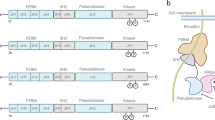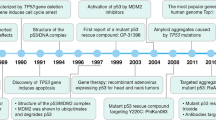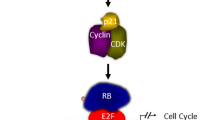Abstract
Testes-specific protease 50 (TSP50), a novelly identified oncogene, has the capacity to induce cell proliferation, cell invasion and tumor growth. Further studies indicated that CAGA-luc (an activin-responsive reporter construct) reporter activity could be significantly suppressed by TSP50 overexpression, implying that the activin signaling may participate in TSP50-mediated cell proliferation. Here, we reported that TSP50 had an inhibitory effect on activin signaling. Mechanistic studies revealed that TSP50 could interact with ActRIIA, inhibit activin typeIreceptor (ActRIB) phosphorylation, repress Smad2/3 nuclear accumulation and finally promote cell proliferation by reducing the expression of activin signal target gene p27. Additionally, we found that ActRIB activation could reverse TSP50-mediated cell proliferation and tumor growth. Furthermore, analysis of human breast cancer specimens by immunohistochemistry indicated that TSP50 expression was negatively related to p-Smad2/3 and p27 protein levels. Most importantly, breast cancer diagnosis-related indicators such as tumor size, tumor grade, estrogen receptor (ER), progesterone receptor (PR) and human epidermal growth factor receptor 2 (HER-2) levels, were correlated well with TSP50/p-Samd2/3 and TSP50/p27 expression status. Thus, our studies revealed a novel regulatory mechanism underlying TSP50-induced cell proliferation and provided a new favorable intervention target for the treatment of breast cancer.
This is a preview of subscription content, access via your institution
Access options
Subscribe to this journal
Receive 50 print issues and online access
$259.00 per year
only $5.18 per issue
Buy this article
- Purchase on Springer Link
- Instant access to full article PDF
Prices may be subject to local taxes which are calculated during checkout








Similar content being viewed by others
References
Shan J, Yuan L, Xiao Q, Chiorazzi N, Budman D, Teichberg S et al. TSP50, a possible protease in human testes, is activated in breast cancer epithelial cells. Cancer Res 2002; 62: 290–294.
Yuan L, Shan J, De Risi D, Broome J, Lovecchio J, Gal D et al. Isolation of a novel gene, TSP50, by a hypomethylated DNA fragment in human breast cancer. Cancer Res 1999; 59: 3215–3221.
Liu F, Cao Q, Liu N, Li C, You C, Liu C et al. Overexpression of testes-specific protease 50 (TSP50) predicts poor prognosis in patients with gastric cancer. Gastroenterol Res Pract 2014; 2014: 498246.
Yuan J, Wu C, Huang M, Zhou J, Ben W, Zhang G . TSP50 depends on its threonine protease activity and its interactions with TNF-alpha-induced NF-kappaB for its role in human cervical tumorigenesis. Cell Biochem Biophys 2015; 71: 891–896.
Zheng L, Xie G, Duan G, Yan X, Li Q . High expression of testes-specific protease 50 is associated with poor prognosis in colorectal carcinoma. PLoS One 2011; 6: e22203.
Song ZB, Bao YL, Zhang Y, Mi XG, Wu P, Wu Y et al. Testes-specific protease 50 (TSP50) promotes cell proliferation through the activation of the nuclear factor kappaB (NF-kappaB) signalling pathway. Biochem J 2011; 436: 457–467.
Song ZB, Ni JS, Wu P, Bao YL, Liu T, Li M et al. Testes-specific protease 50 promotes cell invasion and metastasis by increasing NF-kappaB-dependent matrix metalloproteinase-9 expression. Cell Death Dis 2015; 6: e1703.
Li YY, Bao YL, Song ZB, Sun LG, Wu P, Zhang Y et al. The threonine protease activity of testes-specific protease 50 (TSP50) is essential for its function in cell proliferation. PLoS One 2012; 7: e35030.
Song ZB, Liu B, Li YY, Wu P, Bao YL, Huang YX et al. The catalytic triad of testes-specific protease 50 (TSP50) is essential for its function in cell proliferation. Cell Signal 2014; 26: 2266–2275.
Tsuchida K . Activins, myostatin and related TGF-beta family members as novel therapeutic targets for endocrine, metabolic and immune disorders. Curr Drug Targets Immune Endocr Metabol Disord 2004; 4: 157–166.
Tsuchida K, Nakatani M, Yamakawa N, Hashimoto O, Hasegawa Y, Sugino H . Activin isoforms signal through type I receptor serine/threonine kinase ALK7. Mol Cell Endocrinol 2004; 220: 59–65.
Chen YG, Lui HM, Lin SL, Lee JM, Ying SY . Regulation of cell proliferation, apoptosis, and carcinogenesis by activin. Exp Biol Med (Maywood) 2002; 227: 75–87.
Chen YG, Wang Q, Lin SL, Chang CD, Chuang J, Ying SY . Activin signaling and its role in regulation of cell proliferation, apoptosis, and carcinogenesis. Exp Biol Med (Maywood) 2006; 231: 534–544.
Shav-Tal Y, Zipori D . The role of activin a in regulation of hemopoiesis. Stem Cells 2002; 20: 493–500.
Ying SY, Zhang Z, Furst B, Batres Y, Huang G, Li G . Activins and activin receptors in cell growth. Proc Soc Exp Biol Med 1997; 214: 114–122.
Burdette JE, Jeruss JS, Kurley SJ, Lee EJ, Woodruff TK . Activin A mediates growth inhibition and cell cycle arrest through Smads in human breast cancer cells. Cancer Res 2005; 65: 7968–7975.
Burdette JE, Woodruff TK . Activin and estrogen crosstalk regulates transcription in human breast cancer cells. Endocr Relat Cancer 2007; 14: 679–689.
Kaneda H, Arao T, Matsumoto K, De Velasco MA, Tamura D, Aomatsu K et al. Activin A inhibits vascular endothelial cell growth and suppresses tumour angiogenesis in gastric cancer. Br J Cancer 2011; 105: 1210–1217.
Deli A, Kreidl E, Santifaller S, Trotter B, Seir K, Berger W et al. Activins and activin antagonists in hepatocellular carcinoma. World J Gastroenterol 2008; 14: 1699–1709.
Dennler S, Itoh S, Vivien D, ten Dijke P, Huet S, Gauthier JM . Direct binding of Smad3 and Smad4 to critical TGF beta-inducible elements in the promoter of human plasminogen activator inhibitor-type 1 gene. EMBO J 1998; 17: 3091–3100.
Wiercinska E, Naber HP, Pardali E, van der Pluijm G, van Dam H, ten Dijke P . The TGF-beta/Smad pathway induces breast cancer cell invasion through the up-regulation of matrix metalloproteinase 2 and 9 in a spheroid invasion model system. Breast Cancer Res Treat 2011; 128: 657–666.
Franzen A, Heldin NE . BMP-7-induced cell cycle arrest of anaplastic thyroid carcinoma cells via p21(CIP1) and p27(KIP1). Biochem Biophys Res Commun 2001; 285: 773–781.
Mathews LS . Activin receptors and cellular signaling by the receptor serine kinase family. Endocr Rev 1994; 15: 310–325.
Xu H, Shan J, Jurukovski V, Yuan L, Li J, Tian K . TSP50 encodes a testis-specific protease and is negatively regulated by p53. Cancer Res 2007; 67: 1239–1245.
Gu Z, Nomura M, Simpson BB, Lei H, Feijen A, van den Eijnden-van Raaij J et al. The type I activin receptor ActRIB is required for egg cylinder organization and gastrulation in the mouse. Genes Dev 1998; 12: 844–857.
Attisano L, Wrana JL, Montalvo E, Massague J . Activation of signalling by the activin receptor complex. Mol Cell Biol 1996; 16: 1066–1073.
Mylonas I, Jeschke U, Shabani N, Kuhn C, Friese K, Gerber B . Inhibin/activin subunits (inhibin-alpha, -betaA and -betaB) are differentially expressed in human breast cancer and their metastasis. Oncol Rep 2005; 13: 81–88.
Reis FM, Luisi S, Carneiro MM, Cobellis L, Federico M, Camargos AF et al. Activin, inhibin and the human breast. Mol Cell Endocrinol 2004; 225: 77–82.
Coqueret O . New roles for p21 and p27 cell-cycle inhibitors: a function for each cell compartment? Trends Cell Biol 2003; 13: 65–70.
Wang X, Gao P, Long M, Lin F, Wei JX, Ren JH et al. Essential role of cell cycle regulatory genes p21 and p27 expression in inhibition of breast cancer cells by arsenic trioxide. Med Oncol 2011; 28: 1225–1254.
Bauer KR, Brown M, Cress RD, Parise CA, Caggiano V . Descriptive analysis of estrogen receptor (ER)-negative, progesterone receptor (PR)-negative, and HER2-negative invasive breast cancer, the so-called triple-negative phenotype: a population-based study from the California cancer Registry. Cancer 2007; 109: 1721–1728.
Massague J . TGFbeta signalling in context. Nat Rev Mol Cell Biol 2012; 13: 616–630.
Sozzani S, Musso T . The yin and yang of Activin A. Blood 2011; 117: 5013–5015.
Panopoulou E, Murphy C, Rasmussen H, Bagli E, Rofstad EK, Fotsis T . Activin A suppresses neuroblastoma xenograft tumor growth via antimitotic and antiangiogenic mechanisms. Cancer Res 2005; 65: 1877–1886.
Hinz M, Scheidereit C . The IkappaB kinase complex in NF-kappaB regulation and beyond. EMBO Rep 2014; 15: 46–61.
Monteleone G, Mann J, Monteleone I, Vavassori P, Bremner R, Fantini M et al. A failure of transforming growth factor-beta1 negative regulation maintains sustained NF-kappaB activation in gut inflammation. J Biol Chem 2004; 279: 3925–3932.
Freudlsperger C, Bian Y, Contag Wise S, Burnett J, Coupar J, Yang X et al. TGF-beta and NF-kappaB signal pathway cross-talk is mediated through TAK1 and SMAD7 in a subset of head and neck cancers. Oncogene 2013; 32: 1549–1559.
Luo K . Signaling cross talk between TGF-beta/Smad and other signaling pathways. Cold Spring Harb Perspect Biol 2017; 9: 1–28.
Alexander JM, Bikkal HA, Zervas NT, Laws ER Jr., Klibanski A . Tumor-specific expression and alternate splicing of messenger ribonucleic acid encoding activin/transforming growth factor-beta receptors in human pituitary adenomas. J Clin Endocrinol Metab 1996; 81: 783–790.
Danila DC, Zhang X, Zhou Y, Haidar JN, Klibanski A . Overexpression of wild-type activin receptor alk4-1 restores activin antiproliferative effects in human pituitary tumor cells. J Clin Endocrinol Metab 2002; 87: 4741–4746.
Landis MD, Seachrist DD, Montanez-Wiscovich ME, Danielpour D, Keri RA . Gene expression profiling of cancer progression reveals intrinsic regulation of transforming growth factor-beta signaling in ErbB2/Neu-induced tumors from transgenic mice. Oncogene 2005; 24: 5173–5190.
Dai JY, Liang XP, Wen JL, Li CY, Deng CZ, Zhang ZH . Expression of P27 protein and cyclin E in colon cancer. Ai Zheng 2003; 22: 1093–1095.
Fang Z, Zhang T, Dizeyi N, Chen S, Wang H, Swanson KD et al. Androgen Receptor Enhances p27 Degradation in Prostate Cancer Cells through Rapid and Selective TORC2 Activation. J Biol Chem 2012; 287: 2090–2098.
Galizia G, Ferraraccio F, Lieto E, Orditura M, Castellano P, Imperatore V et al. Prognostic value of p27, p53, and vascular endothelial growth factor in Dukes A and B colon cancer patients undergoing potentially curative surgery. Dis Colon Rectum 2004; 47: 1904–1914.
Chen XS, Ma CD, Wu JY, Yang WT, Lu HF, Wu J et al. Molecular subtype approximated by quantitative estrogen receptor, progesterone receptor and Her2 can predict the prognosis of breast cancer. Tumori 2010; 96: 103–110.
Huang HJ, Neven P, Drijkoningen M, Paridaens R, Wildiers H, Van Limbergen E et al. Association between tumour characteristics and HER-2/neu by immunohistochemistry in 1362 women with primary operable breast cancer. J Clin Pathol 2005; 58: 611–616.
Shi Y, Bao YL, Wu Y, Yu CL, Huang YX, Sun Y et al. Alantolactone inhibits cell proliferation by interrupting the interaction between Cripto-1 and activin receptor type II A in activin signaling pathway. J Biomol Screen 2011; 16: 525–535.
Zhang Y, Zhou L, Bao YL, Wu Y, Yu CL, Huang YX et al. Butyrate induces cell apoptosis through activation of JNK MAP kinase pathway in human colon cancer RKO cells. Chem Biol Interact 2010; 185: 174–181.
Acknowledgements
This research was supported by grants from the National Natural Science Foundation of China (Grant no. 81272242 and 81502284), the Open Project of the National Engineering Laboratory for Druggable Gene and Protein Screening, Northeast Normal University (No.130014561 and 130028683) and Jilin outstanding young talent Foundation (Grant no. 20170520031JH).
Author contributions
YLB and YXL conceived the experiments. ZBS, PW, LGS, CLY and YXH carried out experiments. ZBS, PW, JSN, TL, CF and YW analyzed the data. ZBS and PW wrote the manuscript.
Author information
Authors and Affiliations
Corresponding authors
Ethics declarations
Competing interests
The authors declare no conflict of interest.
Additional information
Supplementary Information accompanies this paper on the Oncogene website
Supplementary information
Rights and permissions
About this article
Cite this article
Song, ZB., Wu, P., Ni, JS. et al. Testes-specific protease 50 promotes cell proliferation via inhibiting activin signaling. Oncogene 36, 5948–5957 (2017). https://doi.org/10.1038/onc.2017.198
Received:
Revised:
Accepted:
Published:
Issue Date:
DOI: https://doi.org/10.1038/onc.2017.198
This article is cited by
-
TSP50 promotes the Warburg effect and hepatocyte proliferation via regulating PKM2 acetylation
Cell Death & Disease (2021)



